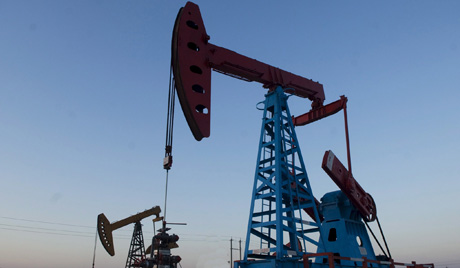
Oil “Export” Duties: a Peculiarity of the Russian-Led Customs Union
Publication: Eurasia Daily Monitor Volume: 7 Issue: 65
By:

The Russian government is apparently moving to operationalize the nominal “union state” with Belarus through a process of economic absorption. Accession to the Russia-Belarus-Kazakhstan Customs Union is not protecting Belarus against this process.
Russia’s introduction of export duties on refined oil products and “petrochemical raw material” supplies to Belarus (Belarus Sues Russia in the CIS Economic Court, EDM, April 5) is the latest move toward that end. It follows Moscow’s imposition of export duties on crude oil deliveries to Belarus on January 1, 2010. Under threat of an imminent stoppage of Russian oil supplies to Belarus refineries, Moscow compelled Minsk to accept that measure in a January 27, 2010 inter-governmental protocol. Those duties apply to 15 million tons of Russian crude oil delivered annually to Belarus, out of the total annual volume of 21 million tons. Belarus is processing the 15 million tons for export of the refined products, and the remainder of 6 million tons for internal consumption of the products.
Those duties have substantially raised the purchase price of Russian oil in Belarus, correspondingly raising the price of refined products exported by Belarus to European countries. This spiral could quickly render the Belarusian refineries uncompetitive. To offset this price spiral, Minsk has been forced to abolish its own duties on the export of oil products from Belarus to European countries. Minsk’s response applies symmetrically to products refined from the 15 million ton portion of Russian crude oil subjected to the Russian export duty (Interfax, March 30).
These measures threaten the viability of Belarusian refineries, the country’s most lucrative economic sector. Minsk’s renunciation of its own export duty on refined products is an almost desperate move to avoid a sharp increase in the export price of its refineries’ production. The response enables those refineries to stay competitive in the short term, but jeopardizes Minsk’s capacity to invest in the refineries’ technological upkeep and modernization in the medium term.
The Russian government has recently encouraged Russian oil producing companies to acquire ownership stakes in the processing plants in Belarus. Raising the price of crude oil supplies to those plants through the export duty is a hostile-takeover tactic. It threatens to price those refineries’ production out of European export markets.
Those duties on crude oil, refined products, and “petrochemical raw materials” directly contravene the free-trade agreements within the Russia-Belarus-Kazakhstan Customs Union. Theoretically at least, the customs union eliminates such duties on all goods within that territory, no longer allowing the exception for crude oil. Belarus has announced its intention to sue Russia in the CIS Economic Court over the crude oil duties, as soon as the Russia-Belarus-Kazakhstan Customs Union takes legal effect on July 1.
Moscow, however, is suddenly claiming that July 1 will not mark a legal watershed after all. According to First Deputy Prime Minister, Igor Shuvalov, the Russia-Belarus-Kazakhstan Customs Union will not become fully operational by that date, but would still require “a whole package of inter-state agreements on the creation of a single economic space….which will take quite a lot of time.” Shuvalov optimistically expects that goal to be accomplished by January 2012 (RIA Novosti, April 1). Pending this, he is warning Minsk and other would-be Customs Union entrants that Russia will continue applying export duties, at least on crude oil and oil products. Shuvalov has delivered this message three times in the space of five days: from Moscow, in Kyiv to Prime Minister Nikolai Azarov, and in Minsk to Lukashenka (Interfax, March 28, April 1, 2).
Lukashenka hopes to enlist support from Kazakhstan in eliminating internal “export” duties within the supposed Customs Union’s territory. He raised that issue with Kazakhstan’s Minister of Foreign Affairs, Kanat Saudabayev, who was visiting Belarus in his concurrent capacity as OSCE chairman-in-office. Lukashenka is warning that internal export duties would invalidate the basic concept of this or any customs union, consigning it to the fate of the CIS or the Eurasian Economic Community (EurAsEc). Minsk would like to hear Astana’s “sincere position” on this issue (Belapan, March 30).
Briefing the media in Minsk, Russian Ambassador Aleksandr Surikov explicitly confirmed Moscow’s goal to turn the state-owned oil and gas enterprises of Belarus into joint Russia-Belarus enterprises (Interfax, Belapan, March 31).
On March 30, Russia’s Gazprom completed the acquisition of 50 percent of the Belarusian gas pipeline operator, BelTransGas; and installed Gazprom’s Vice-Chairman, Valery Golubev, as board chairman of BelTransGas (replacing a deputy prime minister of Belarus). With this move accomplished, Moscow now proposes to turn Belarus’ Hradna plant of nitrate-based fertilizer-(an intensive consumer of natural gas) into a joint Russian-Belarusian enterprise (Interfax, March 31; Belapan, April 1).
Chairing a government session on March 30, Belarusian President, Alyaksandr Lukashenka, directly criticized his Russian counterpart Vladimir Putin over the crude oil and oil products duties, as well as for last year’s restrictions on dairy products and sugar exports from Belarus to the Russian market. Lukashenka has urged his government to respond by promoting “diversification of Belarus’ economic, political, and diplomatic partnerships” (Interfax, March 30).




